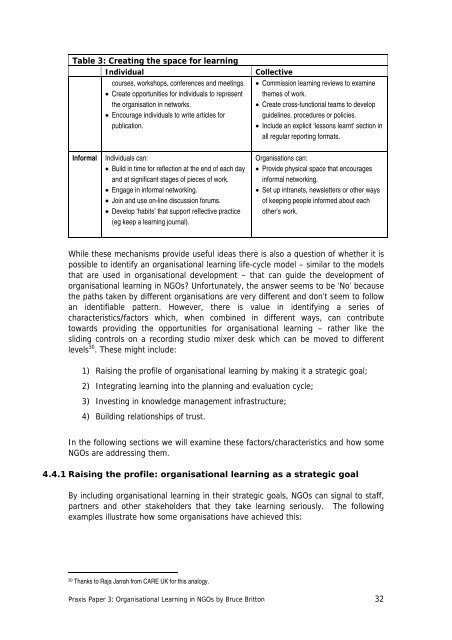Organisational Learning Discussion Paper - Are you looking for one ...
Organisational Learning Discussion Paper - Are you looking for one ...
Organisational Learning Discussion Paper - Are you looking for one ...
You also want an ePaper? Increase the reach of your titles
YUMPU automatically turns print PDFs into web optimized ePapers that Google loves.
Table 3: Creating the space <strong>for</strong> learning<br />
Individual Collective<br />
courses, workshops, conferences and meetings.<br />
• Create opportunities <strong>for</strong> individuals to represent<br />
the organisation in networks.<br />
• Encourage individuals to write articles <strong>for</strong><br />
publication.<br />
In<strong>for</strong>mal Individuals can:<br />
• Build in time <strong>for</strong> reflection at the end of each day<br />
and at significant stages of pieces of work.<br />
• Engage in in<strong>for</strong>mal networking.<br />
• Join and use on-line discussion <strong>for</strong>ums.<br />
• Develop ‘habits’ that support reflective practice<br />
(eg keep a learning journal).<br />
• Commission learning reviews to examine<br />
themes of work.<br />
• Create cross-functional teams to develop<br />
guidelines, procedures or policies.<br />
• Include an explicit ‘lessons learnt’ section in<br />
all regular reporting <strong>for</strong>mats.<br />
Organisations can:<br />
• Provide physical space that encourages<br />
in<strong>for</strong>mal networking.<br />
• Set up intranets, newsletters or other ways<br />
of keeping people in<strong>for</strong>med about each<br />
other’s work.<br />
While these mechanisms provide useful ideas there is also a question of whether it is<br />
possible to identify an organisational learning life-cycle model – similar to the models<br />
that are used in organisational development – that can guide the development of<br />
organisational learning in NGOs? Un<strong>for</strong>tunately, the answer seems to be ‘No’ because<br />
the paths taken by different organisations are very different and don’t seem to follow<br />
an identifiable pattern. However, there is value in identifying a series of<br />
characteristics/factors which, when combined in different ways, can contribute<br />
towards providing the opportunities <strong>for</strong> organisational learning – rather like the<br />
sliding controls on a recording studio mixer desk which can be moved to different<br />
levels 30 . These might include:<br />
1) Raising the profile of organisational learning by making it a strategic goal;<br />
2) Integrating learning into the planning and evaluation cycle;<br />
3) Investing in knowledge management infrastructure;<br />
4) Building relationships of trust.<br />
In the following sections we will examine these factors/characteristics and how some<br />
NGOs are addressing them.<br />
4.4.1 Raising the profile: organisational learning as a strategic goal<br />
By including organisational learning in their strategic goals, NGOs can signal to staff,<br />
partners and other stakeholders that they take learning seriously. The following<br />
examples illustrate how some organisations have achieved this:<br />
30 Thanks to Raja Jarrah from CARE UK <strong>for</strong> this analogy.<br />
Praxis <strong>Paper</strong> 3: <strong>Organisational</strong> <strong>Learning</strong> in NGOs by Bruce Britton<br />
32
















![CynefinFramework final [Read-Only]](https://img.yumpu.com/19017304/1/190x135/cynefinframework-final-read-only.jpg?quality=85)